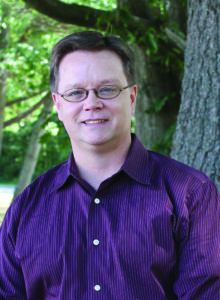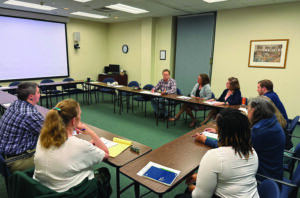By Tom Jarvis
For Lean consultant Joe McCue, the winding road from mechanical engineer to wellness coach to process improvement expert has always been guided by a single principle: “helping people in a meaningful way.”
That guiding thread now connects McCue’s latest work with the New Hampshire Bar Association (NHBA), where a Lean initiative launched this past January is already showing signs of early success in streamlining the annual attorney license renewal process.
“Lean is an overarching philosophy of improving organizations to deliver more value to their customers using fewer resources,” McCue says.
Since January, McCue has worked closely with NHBA staff to examine and refine the complex renewal workflow. As of early July, 82 percent of members had completed all three required steps – up from under 72 percent at the same time last year. By late July, 87 percent were in full compliance compared to 81 percent the previous year. Incremental gains also appeared in key components: dues payments rose from 86 to 91 percent, trust account compliance form submissions improved from 89 to 93 percent, and NHMCLE compliance edged up from 86 to 88 percent.
This uptick reflects the early payoff of a Lean approach built on continuous, incremental improvement. This is especially significant to members who will be assessed delinquency fees if they do not fulfill the renewal requirements.
In 2023, more than 1,000 members were assessed delinquency fees. During the following year, in the week leading up to the renewal deadline, Bar staff called individual attorneys who had not yet completed the renewal process, and that number dropped to 400. This year, the Lean work made a marked impact with fees assessed against only 227 members.
“Once we got the process mapped out, that’s when we could start identifying where the bottlenecks were and make some changes,” McCue explains. “And that’s where the big dividends come from – when people start thinking differently about the work they do.”
But McCue didn’t begin his career helping organizations think differently. He started as a mechanical engineer after graduating from the University of Massachusetts Lowell in 1992. That life – and identity – were upended when, at age 30, he was diagnosed with cancer.
What began as a personal health crisis soon became a complete redirection of his professional path.
“I started to realize that diet played a very big role in health and wellness, and my diet was not good at all in any rational objective measurement,” McCue recalls.
His research led him to a massage therapy and nutrition program in the mountains of Northern California. At first, he only wanted to take a class in whole-food nutrition taught by author Paul Pitchford. But when the school told him he had to enroll in the entire residential program – shiatsu massage and all – he figured he’d sit through the bodywork classes and focus on the food.
“Two or three weeks in, I was hooked,” McCue says. “I was blown away by how effective the treatments were and how much more I could help people along those lines.”
He earned multiple certifications in bodywork and began practicing massage therapy for cancer patients, including through training at Memorial Sloan Kettering in New York. But that wasn’t the end of his transformation. A second cancer diagnosis – and a grueling course of chemotherapy – further reshaped his perspective.
“It really made me appreciate potentially overlooked moments of gratitude,” he says. “Like, I woke up today relatively pain-free. I have a roof over my head. I have food in the fridge. I have a great job. Before cancer, I never gave those things a second thought.”
That gratitude and clarity informed everything that followed. After moving to Chicago and earning a master’s degree in organizational wellness from DePaul University in 2013, McCue began teaching wellness and bodywork courses at multiple colleges, including Great Bay Community College and Pacific College of Oriental Medicine. He found the same sense of purpose in teaching that he’d felt in engineering and bodywork.
“I kept having that same moment: this is it. This is what I want to do for the rest of my life,” he says.
When he returned to New Hampshire, McCue joined the New Hampshire Department of Transportation, where he now serves as both wellness coordinator and lean coordinator. He began Lean training in 2018, earned his Black Belt in 2020, and was appointed chair of the statewide Lean Executive Committee in 2022.
“Lean really brought everything together,” he says. “All the wellness stuff, the organizational development, the engineering – it all clicked.”
Through his role on the Lean Executive Committee, McCue was invited to assist the New Hampshire Judicial Branch with several improvement projects – starting with a complex case-transfer issue between Circuit and Superior Courts. His first project, “Felony First Rewind,” involved helping court staff identify and streamline pain points in the felony case transfer process.
One of the most impactful efforts followed shortly after: a collaboration with the Electronic Estates Filing Center (EEFC), which had recently centralized probate case processing from across the state. The EEFC was grappling with a growing backlog and operational bottlenecks when McCue came in to facilitate a Lean process review.
“At first, some of the people on the improvement team were kind of ‘volun-told’ to be there,” McCue recalls. “But what was amazing was those early skeptics turned into the biggest proponents by the end.”
The project proved to be a turning point – not only in reducing delays, but in building a culture of ownership among team members. That collaboration also laid the groundwork for McCue’s later project with the NHBA. When Sarah Blodgett, who had overseen the EEFC Lean project, joined the Bar Association as executive director, she reached out again.

In 2023, McCue launched NH OpEx, LLC – OpEx is short for operational excellence – to offer Lean consulting services to organizations across New Hampshire. Today, in addition to his state work, he continues to operate NH OpEx, providing training and process improvement guidance to service sector organizations – and offering pro bono support to nonprofits on a limited basis.
At the NHBA, his role has been less about giving answers and more about helping staff ask the right questions – and work together to find solutions. He describes Lean as a cultural shift as much as a set of tools, one that emphasizes respect for people and continuous improvement.
“Part of the efficiency problem that many organizations encounter is that people only see the process from their perspective. So they try to improve just their section without really understanding the effects down the line – a mistake that might create some short-term benefits but ultimately drags on the overall system. But when everyone is in the same room, looking at the same map together, that’s when the lightbulbs go off.”
While it’s still in its early days, McCue sees promise in the NHBA’s embrace of Lean – and in the team’s willingness to think differently.
“My job isn’t to fix the process,” he says. “My job is to help the people who do the work think about it in new ways, so they can fix it themselves.”
It’s a philosophy he’s earned the hard way – through data, through teaching, and through adversity. And it’s one that continues to guide his ever-evolving journey.
“I could help one person at a time as a massage therapist,” McCue reflects. “But if I can help an organization improve how it works? That’s helping hundreds. Maybe thousands. And that’s a life well spent.”
As the NHBA continues into its first renewal cycle under the Lean model, the focus will remain on small, sustainable improvements – and the culture shift that underpins them.
“If we can get more members in compliance, this will have been a success,” Blodgett says.
For McCue, success is measured in more than numbers.
“My job is to educate employees to do their processes better,” he says. “If I can help them think differently about their work – and do it in a way that helps more people – then I’m doing what I was meant to do.”
For more information about McCue’s consulting work, visit NHOpEx.com.
